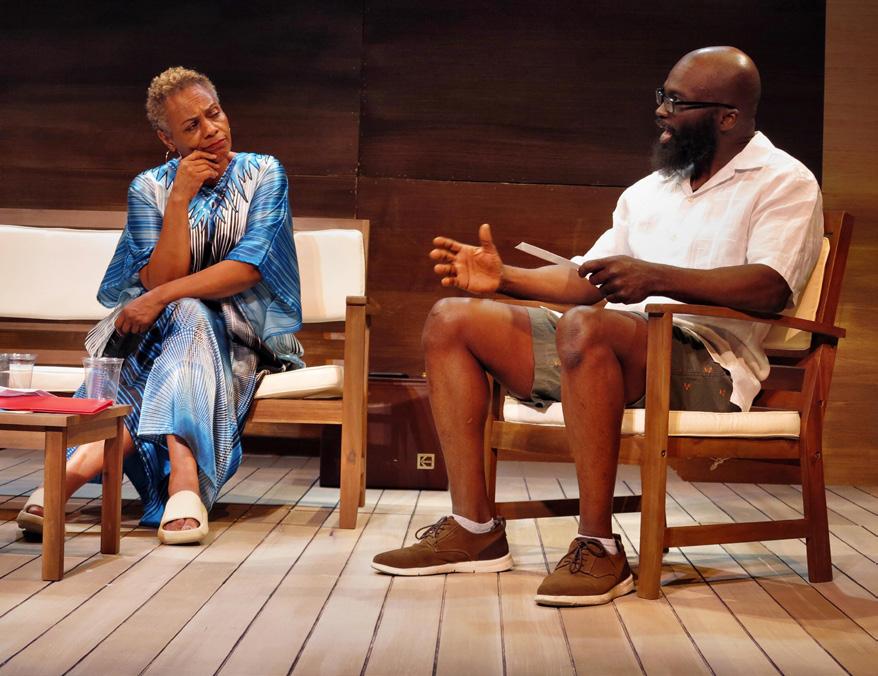
2 minute read
‘Unentitled’ brought laughs and lessons on legacy
By LINDA ARMSTRONG Special to the AmNews
A sold-out run of Charles White’s “Unentitled” presented by the Negro Ensemble Company was recently completed at 59E59 Theaters. The play was quite entertaining, but in between the multiple laughs, there were a lot of lessons about Black ownership, legacy, and our connection to our past that we should and must pass on to our children.

We meet Frank Saunders, a recently laid-off senior attorney at a law firm. Frank, an older Black attorney along with other older Black attorneys, was weeded out by a larger white firm that took over his company. He has taken a severance package and now faces telling his wife, Deanna, that financially, they are in trouble. Deanna’s family has passed down a gorgeous beachfront home and land in Sag Harbor, where they have always spent their summers. With the loss of his income, Frank comes up with an idea to start his own company but needs start-up money to do so. He decides that this can happen by selling the house and land, which belong to Deanna and her brother Ben. He and Ben have had a strained relationship for years, but now he seeks to repair it to get Ben on his side about selling the house.
Deanna is very much invested in the family’s legacy, and the house where she enjoyed her happiest childhood memories. Deanna also had a very close relationship with her father, a successful doctor, who died. She constantly shares the story of her grandfather buying the land and building the house himself and how this property is the family’s legacy for future generations. Ben, however, had a very different child- hood than Deanna and does not have the same sense of attachment to the house or their father. We find out that Dr. Walters had skeletons in his closet, and one particular skeleton—by the name of Aaron—comes home to claim kinship with Deanna and Ben. Aaron declares that he is the bastard son of Dr. Walters and gets a DNA test to prove it. This story illustrates how people can have a totally different side to them that they hide from some family members; and in the end, everyone is human and flawed. The question is, once an individual commits an act that his family con- siders a betrayal, how do you react to the person who is the fruit of that action, but has been left out of the family legacy and is alone? This play lets you see, through a lot of funny, touching moments, that we all just want to belong to a family and to feel recognized and loved. (It also deals with the way that society disregards Black men and does not give a second thought about it.) The cast delivered a stunning ensemble performance. Kenya Wilson was on point as Deanna, a woman dedicated to preserving her family’s property and legacy. Leah Finnie was delightful as Alice, Deanna’s mother-in-law, who understood the importance of family and being recognized and accepted by one’s people. Gil Tucker, who played Ben, always brings 150% to every role. (His facial expressions and gestures are comedically priceless!) Reggie Wilson did well in the role of Frank; he demonstrated his character’s anger and frustration at his mistreatment, but also the struggle he felt in trying to figure out a way to keep his family afloat. Adrian Washington was memorable as Aaron, the unacknowledged son of Dr. Walters. White writes plays that are more than entertaining; they possess lessons that speak the truth to the cultural experiences of those he’s writing about. He lets audiences see the plight that people have with a clear, vivid voice. He puts a spotlight on gentrification in places like Sag Harbor. He emphasizes the importance of Black families maintaining their legacies for generations to come. This production had exceptional direction by Florante Galvez. If you see it go up again, please make plans to see it. There were people in the audience that had enjoyed it multiple times during the run.









